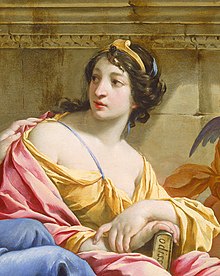Calliope
Trongthần thoại Hy Lạp,Calliope(/kəˈlaɪəpiː/kə-LY-ə-pee;tiếng Hy Lạp cổ:Καλλιόπη,chuyển tựKalliópē,nguyên văn'beautiful-voiced') làNàng thơđại diệntài hùng biệnvàsử thi.HesiodvàOvidgọi cô là "Thủ lĩnh của tất cả các bà mẹ".[1]


Thần thoại
[sửa|sửa mã nguồn]Calliope có hai người con trai nổi tiếng vớiApollohoặc Vua Oeagrus củaThracelàOrpheus[2]và Linus[3].Theo Hesiod, cô cũng là người khôn ngoan nhất trong số các Nàng thơ, cũng như là người quyết đoán nhất. Calliope kết hôn với Oeagrus ở Pimpleia, một thị trấn gầnđỉnh Olympus.[4]Cô được cho là đã đánh bại các con gái của Pierus, vua của Thessaly, trong một trận đấu ca hát, và biến họ thành những con chim ác là để trừng phạt của họ.[5]
Trong một số tài liệu, Corybantes là con trai của Calliope và Zeus.[6]
Mô tả
[sửa|sửa mã nguồn]Calliope thường được thể hiện với một bảng viết trên tay. Đôi khi, cô được miêu tả mang theo một cuộn giấy hoặc một cuốn sách, hoặc đội một chiếc vương miện bằng vàng. Cô cũng được mô tả với các con của mình.
Nhà thơ người ÝDante Alighieri,trong tác phẩmDivine Comedy,đã đề cập đến Calliope:
- Here rise to life again, dead poetry!
- Let it, O holy Muses, for I am yours,
- And here Calliope, strike a higher key,
- Accompanying my song with that sweet air
- which made the wretched Magpies feel a blow
- that turned all hope of pardon to despair
Tham khảo
[sửa|sửa mã nguồn]- ^Hesiod,Theogony79-80. This belief in the goddess's identity, however, really cannot be proved from the text of theIliad,because there is no evidence as to the referent of θεά (goddess). Neither Kirk nor Leaf makes such a claim in their commentaries on theIliad.They simply say that she is "the Muse" (Μοῦσα). See G. S. Kirk, ed.,Books 1–4,vol. I inThe Iliad: A Commentary(Cambridge: Cambridge University Press, 1985), p. 51; and Walter Leaf, ed.,Books I–XII,vol. I ofThe Iliad.2nd ed. (London: Macmillan, 1900), p. 3.
- ^Hoopes And Evslin,The Greek Gods.ISBN0-590-44110-8,ISBN0-590-44110-8,1995, page 77. His father was a Thracian king; his mother the muse Calliope. For a while, he lived on Parnassus with his mother and his eight beautiful aunts and there met Apollo who was courting the laughing muse Thalia. Apollo was taken with Orpheus, gave him his little golden lyre, and taught him to play. And his mother taught him to make verses for singing.
- ^Apollodorus,Library and Epitome,2.4.9, This Linus was a brother of Orpheus; he came to Thebes and became a Theban.
- ^The Argonautica,Book I,(ll. 23–34) First then let us name Orpheus whom once Calliope bare, it is said, wedded to Thracian Oeagrus, near the Pimpleian height. Men say that he by the music of his songs charmed the stubborn rocks upon the mountains and the course of rivers. And the wild oak-trees to this day, tokens of that magic strain, that grow at Zone on the Thracian shore, stand in ordered ranks close together, the same which under the charm of his lyre he led down from Pieria. "
- ^Ovid,Metamorphoses,book 5, lines 294–340, 662–678.
- ^Strabo,Geographica10.3.19
